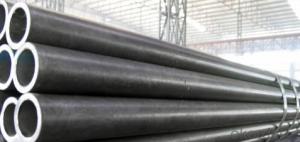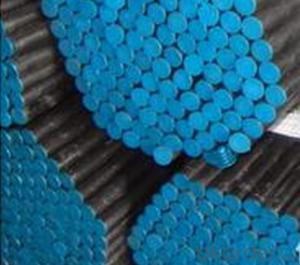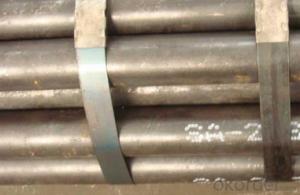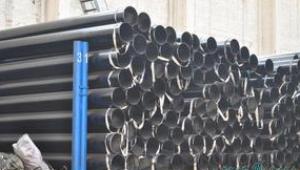Schedule 40 ASTM A53 API 5L GR.B Carbon Seamless Steel Tubes A335P5 CNBM
- Loading Port:
- Qingdao
- Payment Terms:
- TT OR LC
- Min Order Qty:
- 10 pc
- Supply Capability:
- 30 pc/month
OKorder Service Pledge
OKorder Financial Service
You Might Also Like
Quick Details
| Thickness: | 2.0 - 85 mm | Section Shape: | Round | Outer Diameter: | 17 - 914.4 mm |
| Secondary Or Not: | Non-secondary | Application: | Oil Pipe | ||
| Technique: | Hot Rolled | Certification: | API | Surface Treatment: | VARNISH PAITING |
| Special Pipe: | API Pipe | Alloy Or Not: | Non-alloy | END: | PLAIN,BEVELED OR THREADED |
| Grade: | 10#,20#,16Mn,A106(B,C),A210,A335 P5,A335 P91,A53(A,B),API J55,API K55,Q195,Q235,Q345,St37,St52,10#-45#,A53-A369,API J55-API P110,Q195-Q345,ST35-ST52 | Standard: | API 5CT,API 5L,ASME B36.19M-2004,ASTM A106-2006,ASTM A179-1990,ASTM A182-2001,ASTM A53-2007,BS 1387,DIN 1629/3,DIN EN 10216-1-2004,GB 5310-1995,GB/T 3091-2001,GB/T 8162-1999,GB/T 8163-1999,JIS G3454-2007,API,ASTM,BS,DIN,GB,JIS |
Packaging & Delivery
| Packaging Detail: | standard packing suitable shipping by sea.fixed length as customers' requirements, or SRL or DRL. Varnish, painting or galvanized, or FBE ,2PE,3PE 3pp coating,bevelled/plain/threaded ends with caps, packing in bundle (OD smaller than 141.3mm) big sizes packing in loose, marking as required. Shipped by sea,by air,by train . or some samples shipped by DHL,EMS,TNT,FEDEX ect. Length shorter than 5.85m should be shipped by 20' container, 5.85-12m shipped by 40' container. |
| Delivery Detail: | 7-35 days after advance payment |
Product Description
Seamless steel pipes, a large number of used pipes conveying fluids, such as transport oil, natural gas, gas, water pipes and some solid materials, and so on. Compared to other steel and solid steel bar, the same torsional strength in bending, lighter, is an economic cross-section steel, widely used in the manufacture of structural parts and mechanical parts, such as drill pipe, automotive drive shafts, bicycle rack and construction using steel scaffolding ring with steel pipe manufacturing parts, can improve material utilization, simplify the manufacturing process, saving material and machining time, such as bearing rings, jack sets, has been widely used to manufacture steel. Steel or a variety of conventional weapons indispensable material, gun barrels to make steel. Steel shapes in different cross-sectional area can be divided into tube and shaped tubes. As in the perimeter of equal conditions, the largest area of a circle with a circular tube can carry more fluid. In addition, the circular cross section to withstand internal or external radial pressure, the force is uniform, so the vast majority of the pipe is pipe.
- Q:Can steel pipes be used for underground cable conduits?
- Yes, steel pipes can be used for underground cable conduits.
- Q:What is the purpose of steel pipes?
- The purpose of steel pipes is to provide a reliable and efficient means of transporting fluids and gases, such as water, oil, and natural gas, over long distances. They are also used in various industries for structural support, as well as in plumbing and construction projects.
- Q:Can steel pipes be used for chemical storage tanks?
- Steel pipes can be used for chemical storage tanks, but it depends on the specific application and the type of chemicals being stored. Steel is generally a strong and durable material, making it suitable for many industrial applications. However, certain chemicals can react with steel, causing corrosion and potentially compromising the integrity of the tank. In such cases, it is important to use corrosion-resistant coatings or linings on the steel pipes to protect against chemical reactions. Additionally, the design and construction of the tank should adhere to industry standards and regulations to ensure safe storage of chemicals. Therefore, while steel pipes can be used for chemical storage tanks, careful consideration must be given to the type of chemicals being stored and appropriate measures taken to prevent corrosion and ensure safety.
- Q:How can steel pipes be protected from corrosion?
- Steel pipes can be protected from corrosion through various methods. One common method is the application of protective coatings. These coatings act as a barrier between the steel and corrosive elements in the environment. The most widely used protective coating for steel pipes is epoxy, which provides excellent resistance to corrosion. Other coatings such as polyethylene and polyurethane can also be used depending on the specific application and requirements. Another effective way to protect steel pipes from corrosion is by cathodic protection. This technique involves the use of sacrificial anodes or impressed current systems to prevent corrosion. Sacrificial anodes, typically made of zinc or aluminum, are attached to the steel pipes. These anodes corrode instead of the steel, sacrificing themselves to protect the pipes. Impressed current systems, on the other hand, use a direct electrical current to counteract the corrosion process. Regular maintenance and inspection are crucial in the protection of steel pipes from corrosion. Monitoring the condition of the coatings, checking for any signs of damage or deterioration, and promptly addressing any issues can help prevent corrosion from occurring or spreading. Additionally, implementing proper drainage systems to avoid the accumulation of moisture around the pipes can further protect them from corrosion. Lastly, environmental factors should be taken into consideration when protecting steel pipes from corrosion. This includes mitigating exposure to corrosive substances, such as acids or chemicals, and ensuring proper ventilation and airflow to prevent the buildup of moisture and humidity. By implementing a combination of these protective measures, steel pipes can have an extended lifespan and maintain their structural integrity.
- Q:What is the difference between internal and external coating for steel pipes?
- Internal coating for steel pipes refers to the application of a protective layer on the inner surface of the pipe to prevent corrosion and increase durability. This coating is designed to withstand the flow of fluids or gases through the pipe, ensuring the integrity of the material and minimizing the risk of contamination. On the other hand, external coating for steel pipes involves applying a protective layer on the outer surface of the pipe to safeguard it from environmental factors such as moisture, chemicals, or mechanical damage. This coating acts as a barrier, shielding the pipe from corrosion and extending its lifespan. In summary, internal coating focuses on protecting the inner surface of the steel pipe, while external coating aims to safeguard the outer surface. Both coatings are crucial for ensuring the longevity and reliability of steel pipes in various applications.
- Q:How are steel pipes insulated for thermal efficiency?
- Steel pipes are insulated for thermal efficiency by applying a layer of insulating material, such as mineral wool or foam, around the pipe. This insulation helps to reduce heat transfer and prevent energy loss, ensuring that the pipes maintain the desired temperature and improve overall thermal efficiency.
- Q:Can steel pipes be used for underground geothermal systems?
- Indeed, underground geothermal systems can utilize steel pipes. Given their robustness and longevity, steel pipes are frequently employed in geothermal systems. They can endure the elevated temperatures and pressures inherent in the extraction and distribution of geothermal energy. Moreover, steel pipes exhibit excellent resistance to corrosion, a crucial attribute when contending with the subterranean milieu and the diverse array of minerals and chemicals present in the soil. Furthermore, steel pipes possess versatility, enabling straightforward underground installation and connection, rendering them a fitting selection for geothermal systems.
- Q:How are steel pipes used in airport infrastructure?
- Steel pipes are used in airport infrastructure for a variety of applications such as constructing hangars, fuel distribution systems, water supply networks, and underground utility lines. They provide structural support, durability, and resistance to extreme weather conditions, making them essential for the smooth functioning and long-term reliability of airport facilities.
- Q:Can steel pipes be used for firefighting systems?
- Indeed, firefighting systems can utilize steel pipes. Steel pipes are frequently chosen for their robustness and ability to endure high temperatures, making them ideal for transporting water and other fire-suppressing agents. Typically, these pipes are employed in larger commercial or industrial structures that necessitate a larger flow rate and pressure for their fire protection systems. Additionally, steel pipes possess the benefit of withstanding external forces and impacts, thus ensuring the integrity of the firefighting system. Moreover, steel pipes offer the convenience of easy connection, simplifying installation and maintenance procedures. Nonetheless, it is crucial to ensure that the steel pipes employed in firefighting systems undergo appropriate treatment to prevent corrosion and rusting, as these factors may compromise their effectiveness during emergency situations. Regular inspections and maintenance are necessary to guarantee the reliability and functionality of the steel pipes within the firefighting system.
- Q:What are the factors to consider when designing a steel pipe system?
- When designing a steel pipe system, several factors need to be considered. Firstly, the intended purpose of the system and the materials that will be transported through it are crucial. This determines the required pipe diameter, thickness, and material type to ensure compatibility and prevent corrosion or leakage. Secondly, the operating conditions, such as temperature, pressure, and flow rate, must be examined to select pipes with suitable strength and resistance properties. Additionally, factors like environmental conditions, including soil characteristics and exposure to chemicals or natural elements, should be evaluated to determine the necessary protective coatings or insulation. Lastly, considerations like installation requirements, regulatory compliance, and maintenance accessibility should be taken into account to design a practical and efficient steel pipe system.
1. Manufacturer Overview |
|
|---|---|
| Location | |
| Year Established | |
| Annual Output Value | |
| Main Markets | |
| Company Certifications | |
2. Manufacturer Certificates |
|
|---|---|
| a) Certification Name | |
| Range | |
| Reference | |
| Validity Period | |
3. Manufacturer Capability |
|
|---|---|
| a)Trade Capacity | |
| Nearest Port | |
| Export Percentage | |
| No.of Employees in Trade Department | |
| Language Spoken: | |
| b)Factory Information | |
| Factory Size: | |
| No. of Production Lines | |
| Contract Manufacturing | |
| Product Price Range | |
Send your message to us
Schedule 40 ASTM A53 API 5L GR.B Carbon Seamless Steel Tubes A335P5 CNBM
- Loading Port:
- Qingdao
- Payment Terms:
- TT OR LC
- Min Order Qty:
- 10 pc
- Supply Capability:
- 30 pc/month
OKorder Service Pledge
OKorder Financial Service
Similar products
New products
Hot products
Related keywords
































